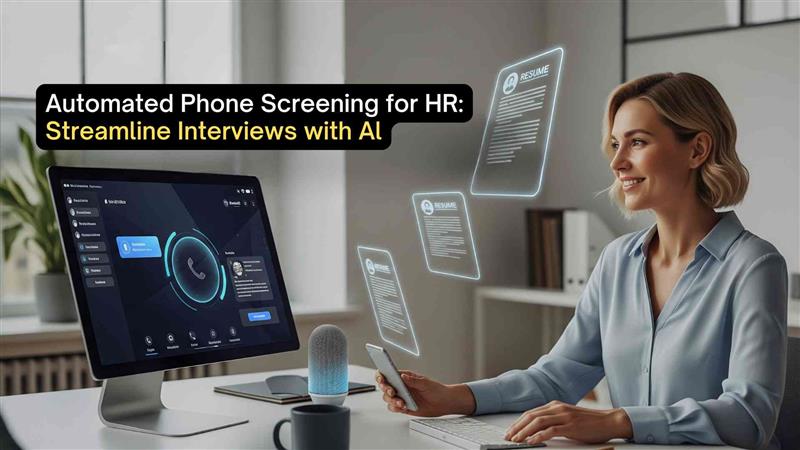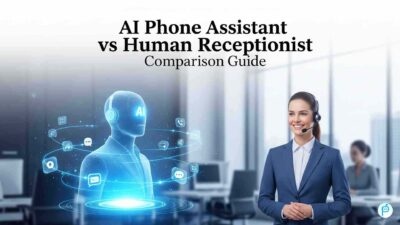TL;DR Automated phone screening for HR handles routine screening tasks automatically. The recruitment landscape has changed dramatically. HR professionals face mounting pressure to find quality candidates faster. Traditional phone screening methods consume valuable time. Companies need efficient solutions to handle high volumes of applicants.
Table of Contents
Artificial intelligence offers a game-changing approach to candidate evaluation. Smart technology can transform how organizations conduct initial interviews. The hiring process becomes more streamlined and effective.
What Is Automated Phone Screening for HR?
Automated phone screening for HR uses artificial intelligence to conduct initial candidate interviews. The system operates without human intervention during the screening phase. AI technology asks predetermined questions to applicants over the phone.
The software records responses and analyzes candidate answers. Natural language processing evaluates communication skills and qualifications. Machine learning algorithms score each applicant based on specific criteria.
HR teams receive detailed reports on each candidate’s performance. The system identifies top prospects for human review.
Companies can screen hundreds of candidates simultaneously. The process runs 24/7 without breaks or scheduling conflicts. Candidates receive immediate feedback about next steps.
Key Benefits of AI-Powered Phone Screening For HR
Time Savings for HR Teams
Manual phone screening consumes hours of HR staff time daily. Each conversation typically lasts 15-30 minutes per candidate. Large companies may screen hundreds of applicants weekly.
AI technology completes screening calls in minutes rather than hours. The system processes multiple candidates simultaneously. HR professionals focus on high-value activities instead of repetitive tasks.
Scheduling becomes automatic rather than manual. Candidates book screening calls through online portals. The system sends reminders and confirmations automatically.
Consistent Interview Experience
Human interviewers may ask different questions to different candidates. Personal bias can influence evaluation decisions. Energy levels fluctuate throughout long screening sessions.
Automated systems deliver identical experiences to every applicant. The same questions appear in the same order consistently. Evaluation criteria remain standardized across all interactions.
This consistency ensures fair treatment for all candidates. Legal compliance improves through standardized processes. Companies reduce discrimination risks significantly.
Enhanced Candidate Experience
Traditional phone screens require complex scheduling coordination. Candidates often wait days for callback opportunities. Time zone differences create additional complications for remote positions.
AI screening offers flexible scheduling options for applicants. Candidates complete interviews at convenient times. The process moves faster from application to decision.
Immediate feedback keeps candidates engaged throughout the process. Clear communication about next steps reduces anxiety. Professional interactions reflect positively on company brand.
How Automated Phone Screening For HR Works
Initial Setup and Configuration
Companies define specific job requirements and qualifications first. HR teams create question banks for different position types. The system learns company-specific evaluation criteria.
Integration with existing applicant tracking systems occurs during setup. Custom scoring models align with organizational hiring standards. Training data helps AI understand successful candidate profiles.
Testing phases ensure system accuracy before full deployment. Sample interviews validate question effectiveness and scoring logic. Calibration sessions fine-tune performance metrics.
The Screening Process For
Candidates receive automated invitations to schedule screening calls. Online booking systems allow flexible appointment selection. Confirmation emails provide clear instructions and expectations.
During the call, AI conducts structured interviews professionally. Questions adapt based on previous responses when appropriate. The system maintains conversational flow naturally.
Voice recognition technology captures and analyzes responses accurately. Natural language processing evaluates content quality and relevance. Sentiment analysis assesses candidate engagement levels.
Results Analysis and Reporting
Detailed scorecards summarize each candidate’s performance immediately. Key metrics highlight strengths and potential concerns. Ranking systems identify top performers automatically.
Integration with HR systems updates candidate records instantly. Automated workflows trigger next steps for qualified applicants. Rejection emails send to unsuitable candidates professionally.
Analytics dashboards show screening program effectiveness over time. Performance metrics help optimize question sets continuously. ROI calculations demonstrate program value clearly.
Essential Features to Look For Automated Phone Screening For HR
Advanced Natural Language Processing
Modern automated phone screening for HR requires sophisticated language understanding. The system must interpret varied speaking styles and accents accurately. Contextual awareness helps evaluate responses appropriately.
Conversation management keeps interviews flowing smoothly. The AI handles interruptions and clarification requests professionally. Multiple language support accommodates diverse candidate pools.
Customizable Question Libraries
Different roles require different screening approaches. Technical positions need specific skill assessments. Customer service roles focus on communication abilities.
Question branching creates personalized interview paths. Follow-up queries dive deeper into relevant topics. Adaptive questioning maximizes information gathering efficiency.
Integration Capabilities
Seamless connection with existing HR technology stacks is essential. API compatibility ensures smooth data flow between systems. Single sign-on capabilities simplify user access management.
Real-time synchronization keeps all platforms updated simultaneously. Automated data transfer reduces manual entry requirements. Standardized formats enable easy reporting and analysis.
Implementation Best Practices
Define Clear Objectives
Successful implementation starts with specific goals and metrics. Companies should identify which positions benefit most from automation. Volume thresholds help determine program scope.
Quality standards must align with existing hiring practices. Scoring criteria should reflect actual job performance requirements. Regular calibration ensures continued accuracy.
Gradual Rollout Strategy Automated Phone Screening For HR
Pilot programs allow testing with limited candidate volumes first. Feedback collection helps identify improvement opportunities early. Iterative refinement improves system performance progressively.
Training sessions prepare HR staff for new workflows. Change management strategies address user concerns proactively. Success metrics track adoption rates and satisfaction levels.
Continuous Optimization
Regular performance reviews identify areas for enhancement. Candidate feedback provides valuable improvement insights. System updates incorporate new features and capabilities.
A/B testing validates question effectiveness and scoring accuracy. Data analysis reveals patterns in successful candidate profiles. Ongoing refinement maintains competitive advantage.
Addressing Common Concerns
Candidate Acceptance
Some applicants may prefer human interaction during interviews. Clear communication about the screening process builds acceptance. Emphasis on efficiency benefits resonates with busy professionals.
Professional AI interactions create positive first impressions. Quality voice synthesis sounds natural and engaging, and smooth conversation flow mimics human interviewer behavior.
Technology Reliability
System uptime requirements demand a robust technical infrastructure. Redundant systems prevent screening disruptions. Regular maintenance schedules ensure optimal performance.
Data security measures protect sensitive candidate information. Encryption protocols safeguard privacy throughout the process. Compliance certifications demonstrate security commitment.
ROI Measurement Automated Phone Screening For HR
Cost savings calculations should include time value and efficiency gains. Quality improvements through consistent screening justify investment. Faster hiring cycles provide competitive recruitment advantages.
Reduced administrative burden allows HR to focus on strategic initiatives. Better candidate matching improves retention rates long-term. Scalability supports business growth without proportional staff increases.
Future Trends in AI Recruitment Automated Phone Screening For HR
Enhanced Personalization Automated Phone Screening For HR
Machine learning algorithms will create more personalized screening experiences. AI will adapt questioning styles to individual candidate preferences. Predictive analytics will identify optimal interview approaches.
Multi-Modal Assessment
Voice analysis will combine with video screening capabilities. Facial expression recognition may supplement verbal responses. Comprehensive candidate profiles will emerge from multiple data sources.
Predictive Hiring Intelligence
AI will more accurately forecast candidate success probability. Historical performance data will continuously refine prediction models, and long-term career trajectory insights will guide hiring decisions.
Read More: Build Phone Automation With No-Code VOice Bot Platform
Conclusion

Automated phone screening for HR represents a significant advancement in recruitment technology. Organizations gain efficiency while maintaining quality standards. Candidates experience faster, more convenient application processes.
Success requires careful planning and gradual implementation. The right technology partner makes implementation smoother. Ongoing optimization ensures maximum return on investment.
Companies embracing AI screening gain competitive advantages in talent acquisition. The technology continues evolving to meet changing business needs. Early adopters position themselves for future recruitment success.
Smart implementation of automated screening transforms HR operations fundamentally. The investment pays dividends through improved efficiency and candidate quality. Modern recruitment demands modern solutions for optimal results.






[…] can scale phone operations without hiring additional staff. Technology offers powerful alternatives. Automation handles routine tasks. AI […]